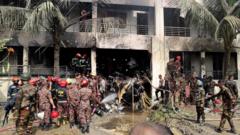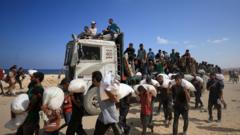Two tragic shootings by Israeli soldiers during aid distribution efforts in Gaza underscore the perilous circumstances surrounding humanitarian assistance in the region. With ongoing warfare leading to a collapse of governance, experts argue for urgent re-evaluation of current aid strategies amidst a dire need for basic supplies.
Aid Crisis in Gaza: Israeli Military Responses Bring New Risks

Aid Crisis in Gaza: Israeli Military Responses Bring New Risks
Recent deadly incidents highlight the dangers of aid distribution methods in Gaza, revealing a complex balance between military control and humanitarian needs.
Over the weekend, two incidents highlighted the precarious situation regarding food distribution in Gaza, with deadly outcomes stemming from both Israeli-backed and U.N.-led efforts. On Saturday, Israeli soldiers opened gunfire on civilians gathered near food distribution sites funded by Israeli private contractors. The following day, similar violence erupted as soldiers shot at crowds rushing toward a U.N. convoy delivering essential aid in Hamas-controlled areas.
Supporters of the Israeli-backed distribution model seized upon the Sunday shooting as evidence of the failures inherent in U.N. operations. Conversely, advocates for the U.N. pointed to the prior incident as a sign of the dangers presented by the Israeli approach. According to Israeli authorities, placing food distribution points in areas outside of Hamas's control is crucial to prevent both theft by the militant group and civilian looting, but critics argue that this places desperate civilians in harm's way as they risk traversing Israeli military zones for aid.
Underlying both crises are several interconnected issues. In the incidents, Israeli military forces opted for lethal responses instead of using non-lethal crowd control methods. Civilians faced the horrifying dilemma of risking death by gunfire while trying to secure food supplies, desperate after an unprecedented 80-day blockade that depleted resources. Compounding the tragedy is the absence of a functional governance structure in Gaza, exacerbated by 22 months of conflict that dismantled much of Hamas’s social services and authority.
Critics have expressed concern that despite Israel dismantling much of Hamas's leadership, Prime Minister Benjamin Netanyahu has yet to establish a viable transitional governance structure, either via military means or the empowering of moderate Palestinian groups. In response to criticism, Netanyahu has insisted that Hamas must be completely neutralized before discussions on future governance can even begin. Yet detractors within Israel highlight the practical challenge of incapacitating Hamas without a comprehensive plan for its aftermath.
Shira Efron, an aid systems expert at the Israel Policy Forum, emphasized the dire need to focus on the lawlessness and governance breakdown in Gaza. “Simply focusing on the mechanical aspects of aid distribution won’t provide a solution,” she stated. With the current humanitarian crisis escalating and security tensions remaining high, the international community faces an urgent challenge to address both immediate needs and the broader structural issues underpinning the conflict.




















